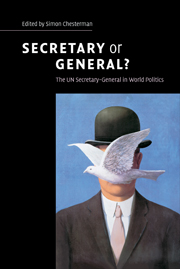Book contents
- Frontmatter
- Contents
- Contributors
- Foreword
- Acknowledgements
- Introduction: secretary or general?
- PART I Defining and refining the job description
- PART II Maintaining peace and security
- PART III Normative and political dilemmas
- PART IV Independence and the future
- APPENDIX: selected documents on the Secretary-General
- 1 Charter of the United Nations, 26 June 1945
- 2 Report of the Preparatory Commission of the United Nations, 23 December 1945
- 3 General Assembly Resolution 11(I), 24 January 1946
- 4 The “Wisnumurti Guidelines” for Selecting a Candidate for Secretary-General, 12 November 1996
- 5 General Assembly Resolution 51/241, 22 August 1997
- 6 Canadian Non-Paper on the Process for the Selection of the Next Secretary-General, 15 February 2006
- 7 General Assembly Resolution 60/286, 8 September 2006
- Select bibliography
- Index
4 - The “Wisnumurti Guidelines” for Selecting a Candidate for Secretary-General, 12 November 1996
Published online by Cambridge University Press: 06 January 2010
- Frontmatter
- Contents
- Contributors
- Foreword
- Acknowledgements
- Introduction: secretary or general?
- PART I Defining and refining the job description
- PART II Maintaining peace and security
- PART III Normative and political dilemmas
- PART IV Independence and the future
- APPENDIX: selected documents on the Secretary-General
- 1 Charter of the United Nations, 26 June 1945
- 2 Report of the Preparatory Commission of the United Nations, 23 December 1945
- 3 General Assembly Resolution 11(I), 24 January 1946
- 4 The “Wisnumurti Guidelines” for Selecting a Candidate for Secretary-General, 12 November 1996
- 5 General Assembly Resolution 51/241, 22 August 1997
- 6 Canadian Non-Paper on the Process for the Selection of the Next Secretary-General, 15 February 2006
- 7 General Assembly Resolution 60/286, 8 September 2006
- Select bibliography
- Index
Summary
Letter from F. Paolo Fulci, Ambassador and Permanent Representative of Italy, President of the Security Council, New York, 31 December 1996.
At the luncheon of Members of the Security Council, hosted on 14 October 1996 by the President for that month, the Permanent Representative of Honduras, H.E. Ambassador Gerardo Martinez Blanco, it was decided to begin the consultations for the Council's recommendation on the appointment of the Secretary-General (Article 97 of the United Nations' Charter) in the following month.
Therefore the question was taken up by the President for November, the Permanent Representative of Indonesia, H.E. Ambassador Nugroho Wisnumurti. At the beginning of his term of office, he submitted to the members of the Security Council a set of guidelines to facilitate the process of selecting a candidate. After slight amendments, the guidelines were adopted at the luncheon he hosted on 12 November, when it was also decided to begin the decision-making process on 18 November. A first vote, on 19 November, was inconclusive.
Italy became the President of the Security Council on 1 December. The “Wisnumurti Guidelines” as they came to be known proved to be instrumental to reaching a decision by acclamation on Mr. Kofi Annan as the candidate recommended to the General Assembly on 13 December. On the same day, the Members of the Council decided that the Guidelines should be printed as a reference document for future occasions when the Council is called on to recommend the appointment of a Secretary-General.
- Type
- Chapter
- Information
- Secretary or General?The UN Secretary-General in World Politics, pp. 248 - 252Publisher: Cambridge University PressPrint publication year: 2007



